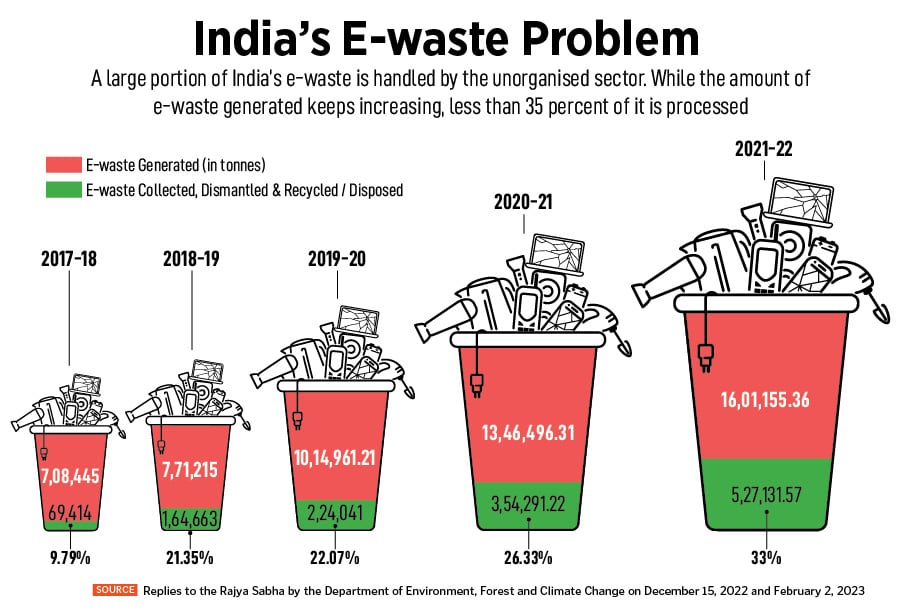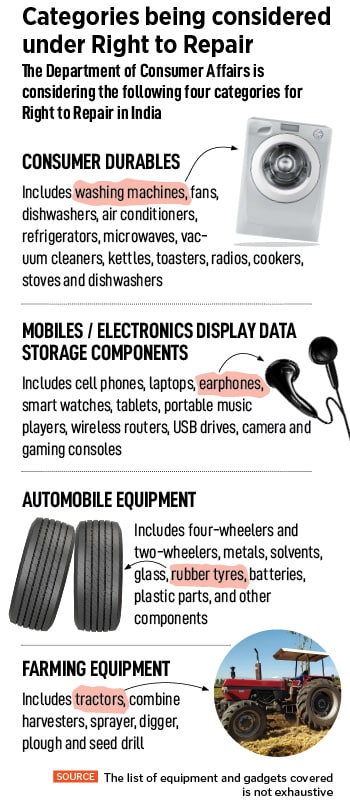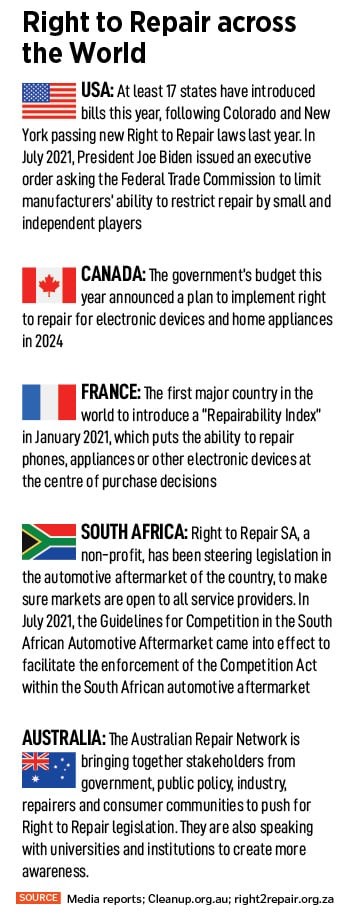Starting with the simplest of things at home to even electrical and electronic equipment, there is almost always an option to repair, reuse or recycle. Basic mindfulness, however, is often drowned out by the convenience of consumerism, where we are quick to use and throw because a new purchase is delivered to our doorstep at the click of a button.
And, in the case of electronic and electrical equipment, it’s not like companies make it any easier for people to extend the life of their products. How many times have you felt like you’re almost paying the price of a new phone to repair an old one? Or how many times has it been a no-brainer to buy new earphones because a cheap, efficient fix for the old ones is hard to come by?
The big picture result is that India generated an estimated 16,01,155.36 tonnes of e-waste in FY22, as per a response to the Rajya Sabha in February by the Ministry of Environment, Forest and Climate Change. According to the response, only 527,131.57 tonnes (or about 33 percent) was collected, dismantled and recycled, which means 67 percent e-waste that is dumped in the country remains unprocessed. A large portion of India’s e-waste is handled by the unorganised sector, and the country produces the most amount of e-waste in the world, following China and the US.
Right to Repair allows you to extend the life of your phones, appliances or other electronic devices by providing you access to repair options by original equipment manufacturers or third-party repairers. The idea is to promote repair as an alternative to excessive replacement of devices. This will help in the fight against e-waste generation, which is contributing to accelerating climate change.
Another objective is to also keep a check on manufacturers engaging in non-competitive practices by prohibiting third-party repairs, limiting the amount of information they share about the product, and controlling who repairs their products.
![]()
“There is a consensus worldwide that we have to adopt green and sustainable practices, and this is bound to affect industries," says Nidhi Khare, additional secretary, Department of Consumer Affairs, Government of India, who is chairing the Right to Repair committee. The sectors covered under Right to Repair are mobile phones and other tech gadgets (like earphones, smartwatches, tablets, portable music players etc), consumer durables, automobiles, and farming equipment.
A few months short of a year after this committee was constituted, it seems to have reached a sticky spot. “We faced a serious issue—which we did not realise initially—which is that Right to Repair cannot be exercised in India without taking manufacturers on board," says committee member GS Bajpai, vice chancellor, National Law University Delhi. He adds that the Department of Consumer Affairs has been working to get these companies on board.
What is the Role of Manufacturers?
The Department of Consumer Affairs has launched a portal where it has started populating information on self-repair manuals, authorised and third-party repairers for companies that have come on board, says Khare. The website shows that there are 15 companies that have come on board as of April 26. These include Samsung India, Hero MotoCorp, boAt, Havells, HP, Microtek, LG, Oppo, Luminous, Panasonic and TAFE Motors and Tractors. “The next step for us is to see that manufacturers do not see this [Right to Repair] as an obstacle, but an integral part of producing goods," says Khare.
For companies, Right to Repair would mean that they have to adapt to new standards of both manufacturing and design. It would mean that they have to share repair information and manuals, and make diagnostic tools and service parts more accessible to consumers and third-party repairers. They would also have to redesign their products in order to make them more repair-friendly.
![]()
This would, according to Bajpai, help break the monopoly of manufacturers. Companies often have proprietary control over spare parts and repair processes, and customers cannot self-repair or approach third-party repairers. According to the note released by the consumer affairs department in the Press Information Bureau during the announcement of the committee, Right to Repair will also help discourage the culture of ‘planned obsolescence’, whereby manufacturers design a gadget in a way that it lasts for a particular time only, and after that period, it has to be mandatorily replaced, as it is extremely hard to fix.
![]() While Right to Repair is a step in the right direction, it “cannot be done overnight" as different electronic devices have different levels of complexity when it comes to repair, says Nitesh Gupta, director, Optiemus Electronics Limited. The manufacturing service provider makes products for companies like Noise, Harman, Boult Audio, Dizo, Gizmore and Primebook. For example, he says, earphones are a more complex product to repair compared to a tablet. “Purely from my experience of manufacturing devices, how repairable a product is also depends on the size and form factor of the devices, the usage type—if the product is stationary or used on-the-go—and also the cost," he says.
While Right to Repair is a step in the right direction, it “cannot be done overnight" as different electronic devices have different levels of complexity when it comes to repair, says Nitesh Gupta, director, Optiemus Electronics Limited. The manufacturing service provider makes products for companies like Noise, Harman, Boult Audio, Dizo, Gizmore and Primebook. For example, he says, earphones are a more complex product to repair compared to a tablet. “Purely from my experience of manufacturing devices, how repairable a product is also depends on the size and form factor of the devices, the usage type—if the product is stationary or used on-the-go—and also the cost," he says.
Companies can work on designs that are more repair-friendly going forward, but this is likely to be a slow process, Gupta adds. “When you buy earphones, for example, the priority of the manufacturer is that it has good sound quality, fits properly and does not break easily if it falls. Making it repair-friendly for third-parties could have its own technical challenges and that is why this is going to be a more gradual process," he explains. “It is important to understand these practical challenges and design policies around it in a way that there is some incentive for everyone."
An entrepreneur in the manufacturing industry who did not want to be quoted on record believes that the implementation of Right to Repair will be easier for more mature industries like smartphones and tablets, and tougher for hearables and wearables—a relatively young category whose “designs and processes are still evolving".
Globally too, manufacturers have raised concerns involving risks to security and intellectual property, and safety issues arising out of unauthorised repair. On July 9, 2021, in response to US President Joe Biden’s executive order to make third-party product repair easier, TechNet, the network of innovation economy CEOs and senior executives in the US issued a statement saying, “Allowing unvetted third parties with access to sensitive diagnostic information, software, tools, and parts would jeopardise the safety of consumers’ computers, tablets and devices, and put them at risk for fraud and data theft."
![]()
On the other hand, a January 19 article in the Harvard Business Review written by Luyi Yang, Chen Jin, and Cungen Zhu on the unintended consequences of Right to Repair laws indicates that in some instances, Right to Repair legislation can lead to manufacturers flooding the market with cheap goods, and in other cases, dramatically raising the price of goods, thereby hurting consumers. “Lawmakers should examine specific product categories, including their production cost and environmental impact, and guard against sweeping, a one-size-fits-all legislation," the article says.
Way Forward in India
Ramesh Vaidyanathan, managing partner, Advaya Legal, believes that in India, Right to Repair should have been given far greater priority by the government than what it has managed to get. “They need to give it more teeth by making suitable amendments to the Consumer Protection Act, and also spelling out consequences and penalties if companies fail to adhere to or honour the Right to Repair," he says.
![]()
According to him, the government has perhaps not been too aggressive with Right to Repair because one of its priorities is to get more manufacturing companies to invest and create jobs in India. It has also been rolling out policies like the Production-Linked Incentive (PLI) scheme towards that end, which is making it challenging for them to push companies too hard on Right to Repair. “They do not want to upset the applecart," he says.
That said, Vaidyanathan agrees that the Right to Repair must take into consideration interests of both consumers and manufacturers, be mindful that the law does not allow anything that involves compromise of intellectual property, unwanted access to proprietary information or any such issues of concern.
![]() Department of Consumer Affairs Additional Secretary Khare tells Forbes India that Right to Repair is being developed with detailed consultation of stakeholders, and that convincing more manufacturers to come on board will not be a challenge. “In fact, the industry has understood that providing these details is only strengthening the after-sales services of their goods. And it also builds trustworthiness and credibility about their products," she says, adding that companies who have come on board see Right to Repair as an important way to reshape their production and make their industry future-ready as more consumers become conscious of sustainability.
Department of Consumer Affairs Additional Secretary Khare tells Forbes India that Right to Repair is being developed with detailed consultation of stakeholders, and that convincing more manufacturers to come on board will not be a challenge. “In fact, the industry has understood that providing these details is only strengthening the after-sales services of their goods. And it also builds trustworthiness and credibility about their products," she says, adding that companies who have come on board see Right to Repair as an important way to reshape their production and make their industry future-ready as more consumers become conscious of sustainability.
Preeti Bajaj, chief executive officer and managing director of Luminous Power Technologies, that makes products like inverters, UPS systems, batteries, fans, lighting, wires and switches, says they joined the government’s portal because it will make after sales-service more efficient, and will also help educating consumers so that they can address repair issues themselves instead of having to reach out to the manufacturer every single time.
“Still, if problems persist or there is a bigger issue at hand, there will be complete process definition on how to raise complaints, escalation matrix and contact details to ensure the resolution is done in a speedy and efficient manner," says Bajaj, over email. She says that the portal can become more relevant to the consumer if there is a provision to upload videos and integrate chat.
HCL co-founder Ajai Chowdhry, whose non-profit EPIC has recently submitted a report to the government suggesting the strategies India can follow to implement Right to Repair, says that pushback from manufacturers will be inevitable, as seen globally. “Something like this takes time, because there will be a lot of naysayers," he explains. According to him, apart from convincing manufacturers to come on board, the consumer affairs department should also float the idea deeply across people in the country and secure their support.
Bajpai of National Law University Delhi says that unlike the West, India has a stronger presence of independent third-party repairers, who can be empowered through Right to Repair, which will make it cheaper for consumers to extend the life of their products. “We can also provide employment to people. Companies supporting Right to Repair can train third-party individuals to repair a product while signing formal agreements of confidentiality. This will also minimise security risks."
He strongly believes that Right to Repair should get legal sanction soon and be part of consumer rights in the country. “By not providing this right, we are actually taking away the right of consumers to choose," he says. “Because right to choose cannot exist without the right to repair."

 In November 2022, India notified the E-Waste (Management) Rules, 2022, which replaced the E-Waste (Management) Rules, 2016, and they have been effective from April 1. A few months prior to that, in July 2022, the Department of Consumer Affairs constituted a committee to develop a comprehensive framework for Right to Repair, on the lines of the LiFE (Lifestyle For Environment) initiative launched by Prime Minister Narendra Modi on mindful and sustainable consumption.
In November 2022, India notified the E-Waste (Management) Rules, 2022, which replaced the E-Waste (Management) Rules, 2016, and they have been effective from April 1. A few months prior to that, in July 2022, the Department of Consumer Affairs constituted a committee to develop a comprehensive framework for Right to Repair, on the lines of the LiFE (Lifestyle For Environment) initiative launched by Prime Minister Narendra Modi on mindful and sustainable consumption.

 While Right to Repair is a step in the right direction, it “cannot be done overnight" as different electronic devices have different levels of complexity when it comes to repair, says Nitesh Gupta, director, Optiemus Electronics Limited. The manufacturing service provider makes products for companies like Noise, Harman, Boult Audio, Dizo, Gizmore and Primebook. For example, he says, earphones are a more complex product to repair compared to a tablet. “Purely from my experience of manufacturing devices, how repairable a product is also depends on the size and form factor of the devices, the usage type—if the product is stationary or used on-the-go—and also the cost," he says.
While Right to Repair is a step in the right direction, it “cannot be done overnight" as different electronic devices have different levels of complexity when it comes to repair, says Nitesh Gupta, director, Optiemus Electronics Limited. The manufacturing service provider makes products for companies like Noise, Harman, Boult Audio, Dizo, Gizmore and Primebook. For example, he says, earphones are a more complex product to repair compared to a tablet. “Purely from my experience of manufacturing devices, how repairable a product is also depends on the size and form factor of the devices, the usage type—if the product is stationary or used on-the-go—and also the cost," he says.

 Department of Consumer Affairs Additional Secretary Khare tells Forbes India that Right to Repair is being developed with detailed consultation of stakeholders, and that convincing more manufacturers to come on board will not be a challenge. “In fact, the industry has understood that providing these details is only strengthening the after-sales services of their goods. And it also builds trustworthiness and credibility about their products," she says, adding that companies who have come on board see Right to Repair as an important way to reshape their production and make their industry future-ready as more consumers become conscious of sustainability.
Department of Consumer Affairs Additional Secretary Khare tells Forbes India that Right to Repair is being developed with detailed consultation of stakeholders, and that convincing more manufacturers to come on board will not be a challenge. “In fact, the industry has understood that providing these details is only strengthening the after-sales services of their goods. And it also builds trustworthiness and credibility about their products," she says, adding that companies who have come on board see Right to Repair as an important way to reshape their production and make their industry future-ready as more consumers become conscious of sustainability.